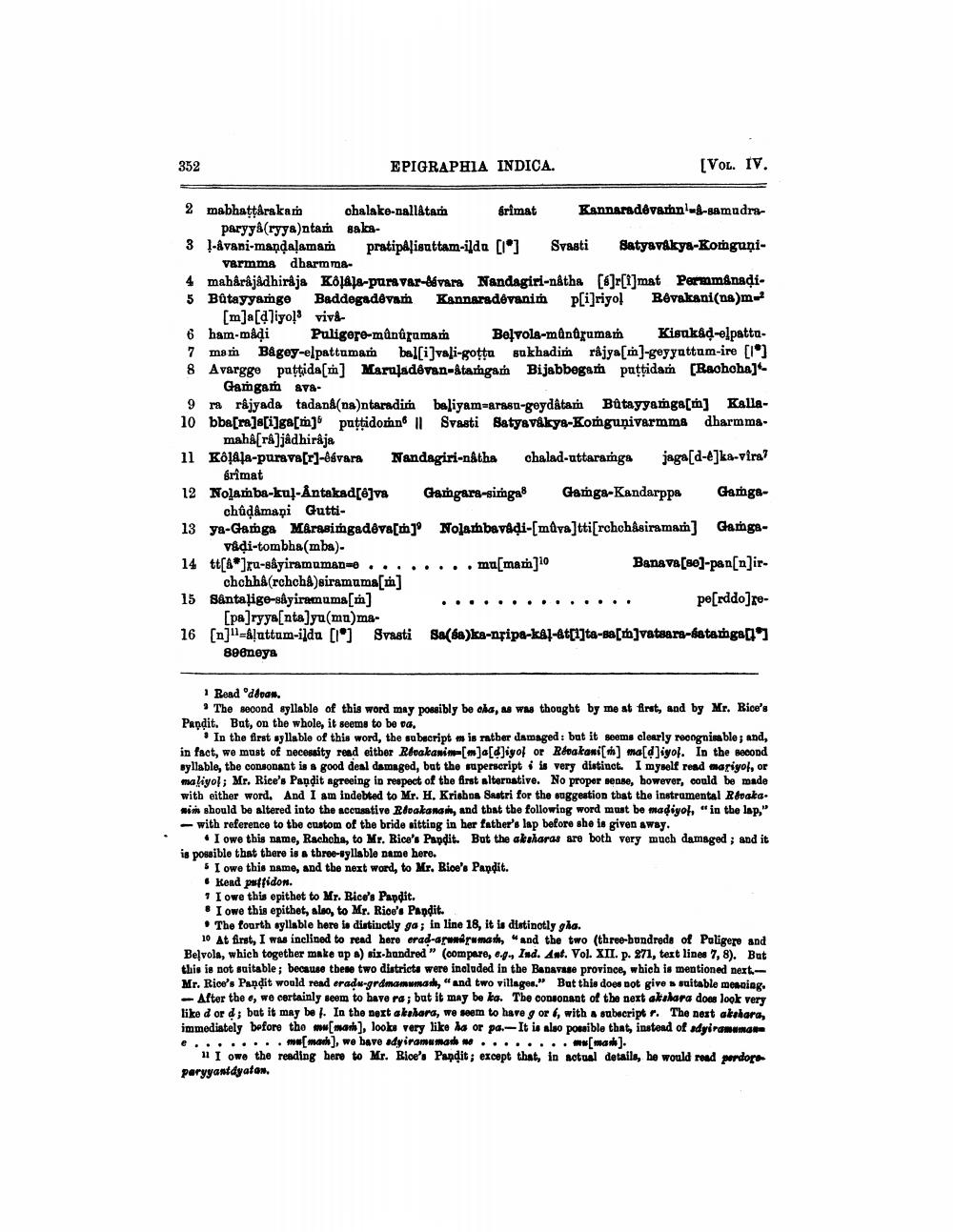________________
352
EPIGRAPHIA INDICA.
[VOL. IV.
2 mabhattarakam chalako-nall&tam s rimat Eannaradevann1--samudra
paryy&(ryya)ntam saka3 -ávani-mandalaman pratipAlisattam-ilda [1] Svasti Satyavákya-Komguni
varmma dharmma4 maharajadhiraja K8jAla-puravar-kvara Nandagiri-natha [6]y[t]mat Permmånadi. 5 Batayyamgo Baddegadevam Kannaradevanin P[i]riyo! Bevakani(na)m
[m]a[aliyo! vive6 ham-madi Puligere-mûntruman Beļvola-mantruman Kisukad-elpatta7 mom Bågey-elpattuman bal[i]vali-gotta sukhadim råjya[m]-geyyattam-ire [*] 8 Avargge pattida[m] Maruladhvan-tangan Bijabbegaṁ puttidam [Rachcha]
Gamga ava9 ra rajyada tadan (na)ntaradim baliyam-aran-goydAtam Batayyamga[m] Kalla10 bba[ra]s[i]ga[m] puţtidon 11 Svasti Satyavikya-Korgunivarmma dharmma
mahå[ra]jâdhiraja 11 Kõlala-purava[r]-svara Nandagiri-natha chalad-attarañga jaga[d-e]ka-vira?
Srimat 12 Nolamba-kul-Antakad[@]ya Gamgara-singa 8 Gamga-Kandarppa Ganga
chůdámaņi Gutti13 ya-Ganga Marasimgadóva[injo Nolambavați-[mûva]tti[rchchasiraman] Ganga
vidi-tombha(mba) 14 tt[&]ru-sayiramuman=e ........ mu[mam]
Banava [se]-pan[n]irchchhâ(rchcha)siramuma[m] 15 Santaļige-sayiramuma[m]
pe[rddo]re[pa]ryya[nta]yu(mu)ma16 [n]i=!attam-ilda [l*j Svasti Sa(sa)ka-nfipa-kal-et[i]ta-ba[m]vatsara-fetargall*i
8ooneya
* Read ddogu.
The second syllable of this word may possibly be oka, as was thought by me at first, and by Mr. Rice's Pandit. But, on the whole, it seems to be a.
In the first syllable of this word, the subcript is rather damaged: but it seems clearly roongnisable; and, in fact, we must of necessity read either Rbvakawiw[]a[&liyo or Reakani ) madliyol. In the second syllable, the consonant is a good deal damaged, but the superscript i is very distinct. I myself read mariyol, or maliyol; Mr. Rice's Pandit agreeing in respect of the first alternative. No proper sense, however, could be made with either word. And I am indebted to Mr. H. Krisboa Sestri for the suggestion that the instrumental Rdraka. mit should be altered into the accusative Rdoakanan, and that the following word must be madigol, "in the lap," - with reference to the custom of the bride sitting in her father's lap before she is given away.
• I owe this name, Rachcha, to Mr. Rice's Pandit. But the akaharas are both very much damaged ; and it is possible that there is a three-syllable dame here.
I owe this name, and the next word, to Mr. Bioe's Pandit. • Kead paffidon. 1 I owe this epithet to Mr. Rice's Pandit. 8 I owe this epithet, aloo, to Mr. Rice's Pandit. • The tourth Syllable here to distinctly ga; in line 18, it is distinotly glo.
10 At first, I was inclined to read horo erad-arwnüumath, "and the two (three-bundreds of Puligere and Belvoln, which together make up a) six-hundred " (compare, e.g. Ind. Ant. Vol. XII. p. 271, text lines 7, 8). But this is not suitable; because these two districts were included in the Banavase province, which is mentioned nextMr. Rice's Pandit would read eradu-gramamumas, "and two villages." But this does not gives suitable meaning - After the , we certainly seem to have ra; bat it may be ka. The consonant of the next akalara does look very liked or d, but it may be. In the next akahara, we seem to have y or 6, with a subscriptr. The next akslara, immediately before the mw[man), looks very like ha or pa.--It is also possible that, instead of adyiramumas e........ mwma, we bave adyiramundo ........ [mas).
11 I owe the reading here to Mr. Bloe's Pandit; except that, in actual details, he would read perdor peryyantdyaton,




